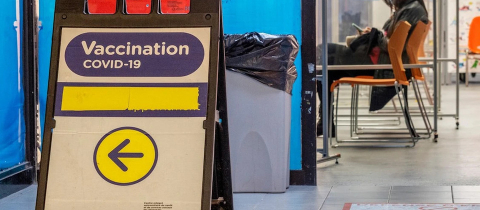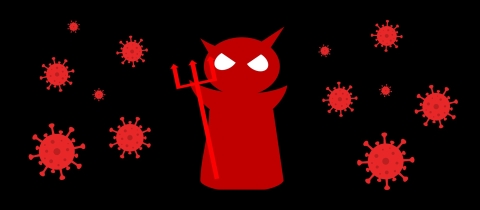We’ve all been through a lot this past year. We have witnessed some of the largest social justice protests in history. Many have lost their jobs and even friends and family members to this global pandemic.
As a mother, I can’t help thinking: How is my three-year-old daughter coping with all this? Will there be lasting effects from her staying at home for months at a time, without physically interacting with anyone other than her parents? Is there a way to stack the deck so she can bounce back or become more resilient after all this disruption and disappointment?
The American Psychological Association defines resilience as “the process of adapting well in the face of adversity, trauma, tragedy, threats or even significant sources of stress.”
Research over the years has shown that we can teach resilience as a life skill that can benefit anyone. But it is a skill that is especially helpful in protecting young children from growing up with a slew of mental and physical health problems caused by stressors in childhood.
Adverse Childhood Experiences (ACEs)
I am lucky that for my family, the pandemic has not caused us any outright trauma or tragedy. But for many families, it has. And some researchers wonder if we will need to consider COVID-19 as an Adverse Childhood Experience, or ACE, for some children.
ACE was a term first used in a groundbreaking study published in 1998 that was led by the Centers for Disease Control and Prevention (CDC) and Kaiser Permanente. The researchers surveyed over 13,000 adult patients from the Kaiser Permanente healthcare plan in San Diego, California. They asked about a number of categories of ACEs, including psychological, physical and sexual abuse as a child. They also surveyed the household dysfunction during a patient’s childhood - problems such as substance abuse, mental illness, parental separation or divorce, having a mother who was treated violently or a household member who was imprisoned.
The researchers then collected a second wave of data by surveying an additional 15,000 patients and added emotional and physical neglect to the initial ACE categories.
All told, the CDC/Kaiser Permanente study collected over 17,000 responses from those they surveyed. They found that almost two-thirds of study participants reported at least one ACE, and more than 20% reported three or more ACEs. They also discovered that as the number of ACEs increased, so did the risk for negative outcomes - outcomes such as increased rates of depression, anxiety, suicide and substance abuse. For example, those patients with four or more ACEs were 12 times more likely to commit suicide than someone with an ACE score of zero. And compared to someone with no ACEs, someone with seven or more ACEs was three times as likely to develop lung cancer and had 3.6 times the chance of developing ischemic heart disease, the world’s biggest killer.
The impact of ACEs on child health & wellbeing
Further research has shown that children exposed to maltreatment showed diminished volume in the prefrontal cortex and hippocampus regions of the brain, which are important for impulse control and higher-level cognitive skills. These same children also had greater activation of the Hypothalamic‐Pituitary‐Adrenal (HPA) axis, which is responsible for the body’s fight or flight response. Dysregulation of the HPA axis has been linked to psychiatric illnesses in adulthood. Finally, these children who were maltreated also showed elevated levels of inflammation. Prolonged inflammation can lead to organ damage, type 2 diabetes, respiratory disorders and a weakened immune response.
Toxic stress, such as ACEs, can affect the brain’s pathways at all points during a child’s development, but children are most vulnerable in the first years of life. This is when the brain is growing, expanding its neural connections and is highly sensitive to change due to experiences, relationships and genetics. The amygdala (where the brain processes fear and threats), the hippocampus (where memory and early learning happens), and the executive function systems, such as the prefrontal cortex (that is responsible for impulse control and higher cognition), are all particularly vulnerable to early life stressors. Because the brain is so sensitive during this time period, this is when interventions to decrease stresses like ACEs can have some of the greatest benefits.
Protective factors
The good news is that your ACE score is not your destiny. Research has found there are factors that can protect you from the negative effects of ACEs and increase your resilience.
From a biological perspective, certain chemicals in the body may help protect against the negative effects of ACEs. For example, research has shown that the hormone DHEA (dehydroepiandrosterone), which is made by the adrenal gland, lessens the negative effects of the stress hormone cortisol on the brain. Scientists have also found that neuropeptide Y, a neurotransmitter found in the brain, is decreased in veterans suffering from PTSD. The peptide has also been shown to reduce anxiety, stress and even pain perception.
Other protective factors have more to do with external experiences than your own biology. These protections fall into three categories: individual (e.g. a child’s capacity for self-regulation), family (e.g. loving support at home) and community (e.g. high-quality early childhood education). And the number one protection a child facing adversity can have is a connection with supportive people - these could be a caring relative, caregiver or an early childhood educator.
As one Harvard Center on the Developing Child report put it: “It is the reliable presence of at least one supportive relationship and multiple opportunities for developing effective coping skills that are the essential building blocks for strengthening the capacity to do well in the face of significant adversity.”
These types of supportive relationships not only protect children from disruption in their development, but they also help a child’s ability to self-regulate and generally become more adaptable and resilient.
I am lucky that my daughter is enrolled in an excellent early childhood education program that takes ACEs seriously - not only for the children but for the teachers, as well. From what the research is telling us, it seems that it’s important for our children - but really all of us - to recognize past adversities so that we can develop the protective skills and relationships we need to improve our resilience and set us up for happier, healthier lives in the future.
Gaia Remerowski is a senior content strategist at Washington University School of Medicine in St. Louis. Her interest in science communication began during her undergraduate studies working as an intern for the McGill Office for Science and Society, where she learned that you don’t have to settle for just “doing science,” you can also tell engaging stories about it.







